Flowers and seeds -> paleontology
Paleontology
Paleontology is the scientific study of the history of life on Earth through the examination of plant and animal fossils. It helps us understand how life has evolved over millions of years and provides valuable insights into ancient ecosystems, climate changes, and the extinction of species.
Key Concepts in Paleontology:
- Fossils: These are the preserved remains or traces of ancient organisms, such as bones, shells, and footprints. Fossils provide direct evidence of past life forms and are crucial for paleontologists to study.
- Evolution: Paleontology plays a significant role in understanding the process of evolution by studying the fossil record. It helps us trace the development of different species and understand the mechanisms of natural selection and adaptation.
- Stratigraphy: This is the study of rock layers (strata) and their arrangement. Paleontologists use stratigraphy to determine the relative ages of fossils and the sequence of events in Earth's history.
- Paleobiology: This field focuses on the biological aspects of ancient organisms, including their anatomy, behavior, and ecological interactions. By studying paleobiology, we can learn about the biology of extinct species and their relationships with the environment.
- Extinction Events: Paleontology helps us understand the causes and effects of mass extinctions in Earth's history, such as the event that led to the extinction of dinosaurs. This knowledge is crucial for understanding current patterns of biodiversity and the impact of environmental changes on living organisms.
Study Tips for Paleontology:
Here are some tips to help you study paleontology effectively:
- Understand Geological Principles: Familiarize yourself with concepts like stratigraphy, sedimentation, and geological time scales, as they form the foundation of paleontological studies.
- Learn about Fossil Identification: Practice identifying different types of fossils and understanding the information they can provide about ancient life forms and environments.
- Explore Evolutionary Biology: Gain knowledge of evolutionary processes, including natural selection, genetic variation, and speciation, to understand how paleontology contributes to our understanding of evolutionary patterns.
- Fieldwork and Excavation: If possible, participate in field trips or volunteer for paleontological excavations to gain hands-on experience and a deeper appreciation for the work of paleontologists.
- Stay Updated: Keep up with current research and discoveries in paleontology by following scientific journals, documentaries, and online resources to broaden your understanding of the field.
By mastering the fundamental principles of paleontology and staying curious about Earth's ancient life forms, you can develop a deep appreciation for the history of life on our planet and the science that unravels its mysteries.
.◂Science Worksheets and Study Guides Fifth Grade. Flowers and seeds
Study Guide Flowers and seeds
Flowers and seeds  Activity Lesson
Activity Lesson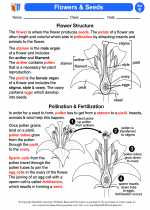 Flowers & Seeds
Flowers & Seeds  Worksheet/Answer key
Worksheet/Answer key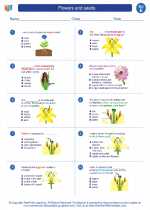 Flowers and seeds
Flowers and seeds  Worksheet/Answer key
Worksheet/Answer key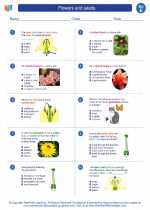 Flowers and seeds
Flowers and seeds  Worksheet/Answer key
Worksheet/Answer key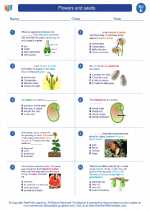 Flowers and seeds
Flowers and seeds  Worksheet/Answer key
Worksheet/Answer key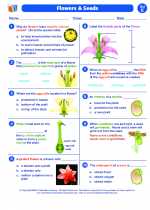 Flowers and seeds
Flowers and seeds  Vocabulary/Answer key
Vocabulary/Answer key Flowers and seeds
Flowers and seeds  Vocabulary/Answer key
Vocabulary/Answer key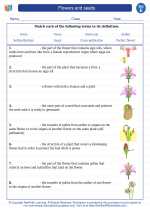 Flowers and seeds
Flowers and seeds 

 Activity Lesson
Activity Lesson
 Worksheet/Answer key
Worksheet/Answer key
 Worksheet/Answer key
Worksheet/Answer key
 Worksheet/Answer key
Worksheet/Answer key
 Worksheet/Answer key
Worksheet/Answer key
 Vocabulary/Answer key
Vocabulary/Answer key
 Vocabulary/Answer key
Vocabulary/Answer key

The resources above cover the following skills:
Life Science
All organisms have structures and systems with separate functions. Students can:
Develop and communicate an evidence-based scientific explanation of the role of different organs or structures that are important for an organism's survival - in both plants and animals